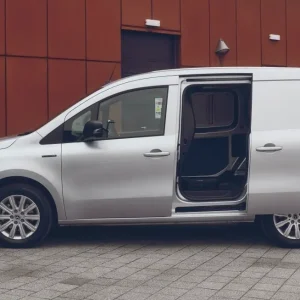The commercial graphics division of the science-based technology giant, 3M, which has manufactured livery wraps for LCVs in the UK for 16 years, has launched a new initiative that covers UK van fleets as part of its global reach.
The 3M Select partner programme covers the application of print wrap films for road and rail transport and works with partners on two levels.
Currently four companies are qualified as Select Platinum Partners: Aura Graphics, VGL (Vinyl Graphics Ltd), Stewart Signs and OPG (Owen Pilling Graphics) and seven as Select gold Partners: RGVA Vehicle Branding, Paul Turner Signwriters, AST Signs, Sign 2000, Joyce Design, Universal Graphics and Service Graphics.
3M qualifies the partners according to 15 criteria covering equipment and standard of work.
Platinum Partners take on the biggest contracts, such as the 20,000-plus vans Stewart Signs wrapped for BT Open Reach while the Gold Partners take on work for local firms such as estate agents and plumbers.
Pen Webley, senior marketing executive for 3M Commercial Graphics says: “We know which fleets will be coming up so we can pitch for them.”
She says the Select wraps, which have already launched in markets such as the US, Canada, Germany and Benelux, are well able to withstand fluctuating UK weather while retaining excellent image quality.
Webley claims 3M’s new Envision Film wraps can fit into vehicles’ deepest recesses and last for up to 12 years (a less durable five-year film is also available) through withstanding extremely hot and cold temperatures, UV rays, moisture and even acid dew. Being non-PVC, she claims the wrap films are environmentally friendly and offer greater tensile strength to increase resistance to tearing, which aids the removal process.
The manufacturing process uses 60% less solvent and that which is used is made in part with bio-based materials. The non-PVC properties mean that no Hydrochloric acid is emitted or produced. Therefore, no neutralisation or pollution control equipment is required for storage or disposal, according to 3M.
3M backs its products with warranties of up to 12 years.
“If it failed we would pay for removal, re-supply, application and labour costs,” says Webley.
Cheap is not cheerful
Fleet decision makers need to focus on quality and whole life costs and beware of plumping for the cheapest option when it comes to choosing vehicle livery, according to graphics and wrapping firm Sign Language, which was acquired by CGI Creative Graphics International in October 2015.
Boss Tobin Jenkins stresses that specifying quality livery vinyl and wrapping at the outset of a company van’s fleet life is critical to safeguard vehicle value at defleet time.
In an unregulated area of the industry, Jenkins also emphasises fleets must use qualified and experienced applicators to apply the wraps.
He points out that fully wrapping a van can result in it achieving a better remarketing value because the vinyl will shield the paintwork from light degradation as well as protecting it against minor stone chips and abrasions, leaving it in “pristine condition”.
With customers including Autoglass, Network Rail, Euro Car Parts, Hertz UK, Leaseplan, Lex Autolease and UK Mail and an online ordering system designed to reduce vehicle downtime, Sign Language has set its sights on the corporate sector.
“These are among the clients we work with who have recognized that using cheap vinyl livery and wrapping can severely impact the second hand value of vehicles,” Jenkins says.
Much like 3M, Jenkins highlights the advantage of using wraps that can be easily removed at remarketing time
“Companies can spend a lot of money decommissioning vehicles at the end of their life, but that cost could have been more than offset had they used top quality vinyl. Quality vinyl is more easily removed at the end of life,” he claims.
Jenkins warns that inexpert applicators using knives to remove livery are likely to damage paintwork and cause corrosion further down the line, necessitating repairs and damaging resale values.
Jenkins wishes to dispel the perception that livery application and removal is easy, unskilled work. He warns that because, unlike for vehicle mechanics, there is no industry-wide accreditation body for applicators, fleet managers must be vigilant in checking their skill levels before taking them on.
A quality wrap not only protects a van’s RVs it also turns it into a free mobile billboard for the business during its working life, he concludes.





